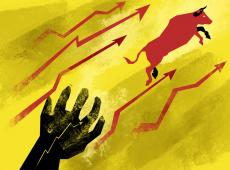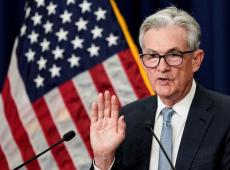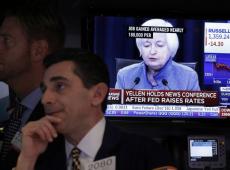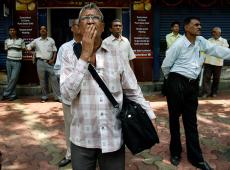Asian Stocks Tumble Following Wall Street Drop
By Rediff Money Desk, Hong Kong Sep 04, 2024 11:30
Asian markets decline after Wall Street's worst day since August, driven by Nvidia's fall and economic concerns. Japan's Nikkei 225 led losses, while Hong Kong's Hang Seng index also declined.
Hong Kong, Sep 4 (AP) Asian stocks tumbled Wednesday after Wall Street had its worst day since early August, with the heavyweight Nvidia falling 9.5 per cent, leading to a global decline in chip-related stocks.
Japan's benchmark Nikkei 225 lost 3.8 per cent to 37,211.09, leading losses in Asia. Electronics and semiconductor company Tokyo Electron slumped 7 per cent in morning trading. South Korea's Kospi was down 3.0 per cent to 2,584.81, with tech giant Samsung Electronics dropping 3.1 per cent. Taiwan's Taiex lost 4.0 per cent, dragged down by the heavyweight Taiwan Semiconductor Manufacturing Company, which was 4.7 per cent lower.
Australia's S&P/ASX 200 was down 2.1 per cent to 7,933.40 after Wednesday data showed the country's GDP grew by 1 per cent compared to the second quarter of 2023, slightly above experts' forecast. Hong Kong's Hang Seng index declined 1.1 per cent to 17,462.25 and the Shanghai Composite index shed 0.5 per cent to 2,789.39.
US futures were lower. Rising oil supply was driving down prices, as Libya moved closer to resolving a conflict over control of the country's oil revenue that meant its oil production may soon increase.
Benchmark US crude fell 45 cents to USD 69.89 a barrel. Brent crude, the international standard, lost 42 cents to USD 73.33 a barrel.
Growing worries about China's economy the world's largest importer of crude oil also amplified doubts about future oil demand, especially after the recent release of weak data, which was dragged down by a real estate slump and weak consumption.
The S&P 500's heaviest weight, Nvidia, fell 9.5 per cent on Tuesday. Its stock has been struggling even after the chip company topped high expectations for its latest profit report. The subdued performance could bolster criticism that Nvidia and other Big Tech stocks simply soared too high in Wall Street's frenzy around artificial-intelligence technology. Global semiconductor-related stocks declined on Wednesday.
On Tuesday, the S&P 500 sank 2.1 per cent to give back a chunk of the gains from a three-week winning streak that had carried it to the cusp of its all-time high. The Dow Jones Industrial Average dropped 626 points, or 1.5 per cent, from its own record set on Friday before Monday's Labour Day holiday. The Nasdaq composite fell 3.3 per cent as Nvidia and other Big Tech stocks led the way lower.
Treasury yields also stumbled in the bond market after a report showed US manufacturing shrank again in August, sputtering under the weight of high interest rates. Manufacturing has been contracting for most of the past two years, and its performance for August was worse than economists expected.
Demand remains subdued, as companies show an unwillingness to invest in capital and inventory due to current federal monetary policy and election uncertainty, said Timothy Fiore, chair of the Institute for Supply Management's manufacturing business survey committee.
Other reports due later this week could show how much help the economy needs, including updates on the number of job openings US employers were advertising at the end of July and how much US services businesses grew last month. The week's highlight will likely arrive on Friday, when a report will show how many jobs US employers created during August.
All told, the S&P 500 fell 119.47 points to 5,528.93. The Dow dropped 626.15 to 40,936.93, and the Nasdaq composite sank 577.33 to 17,136.30.
In the bond market, the yield on the 10-year Treasury fell to 3.84 per cent from 3.91 per cent late Friday. That's down from 4.70 per cent in late April, a significant move for the bond market.
In currency trading, the US dollar was nearly unchanged at 145.48 Japanese yen. The euro cost USD 1.1054, up from USD 1.1043.
Japan's benchmark Nikkei 225 lost 3.8 per cent to 37,211.09, leading losses in Asia. Electronics and semiconductor company Tokyo Electron slumped 7 per cent in morning trading. South Korea's Kospi was down 3.0 per cent to 2,584.81, with tech giant Samsung Electronics dropping 3.1 per cent. Taiwan's Taiex lost 4.0 per cent, dragged down by the heavyweight Taiwan Semiconductor Manufacturing Company, which was 4.7 per cent lower.
Australia's S&P/ASX 200 was down 2.1 per cent to 7,933.40 after Wednesday data showed the country's GDP grew by 1 per cent compared to the second quarter of 2023, slightly above experts' forecast. Hong Kong's Hang Seng index declined 1.1 per cent to 17,462.25 and the Shanghai Composite index shed 0.5 per cent to 2,789.39.
US futures were lower. Rising oil supply was driving down prices, as Libya moved closer to resolving a conflict over control of the country's oil revenue that meant its oil production may soon increase.
Benchmark US crude fell 45 cents to USD 69.89 a barrel. Brent crude, the international standard, lost 42 cents to USD 73.33 a barrel.
Growing worries about China's economy the world's largest importer of crude oil also amplified doubts about future oil demand, especially after the recent release of weak data, which was dragged down by a real estate slump and weak consumption.
The S&P 500's heaviest weight, Nvidia, fell 9.5 per cent on Tuesday. Its stock has been struggling even after the chip company topped high expectations for its latest profit report. The subdued performance could bolster criticism that Nvidia and other Big Tech stocks simply soared too high in Wall Street's frenzy around artificial-intelligence technology. Global semiconductor-related stocks declined on Wednesday.
On Tuesday, the S&P 500 sank 2.1 per cent to give back a chunk of the gains from a three-week winning streak that had carried it to the cusp of its all-time high. The Dow Jones Industrial Average dropped 626 points, or 1.5 per cent, from its own record set on Friday before Monday's Labour Day holiday. The Nasdaq composite fell 3.3 per cent as Nvidia and other Big Tech stocks led the way lower.
Treasury yields also stumbled in the bond market after a report showed US manufacturing shrank again in August, sputtering under the weight of high interest rates. Manufacturing has been contracting for most of the past two years, and its performance for August was worse than economists expected.
Demand remains subdued, as companies show an unwillingness to invest in capital and inventory due to current federal monetary policy and election uncertainty, said Timothy Fiore, chair of the Institute for Supply Management's manufacturing business survey committee.
Other reports due later this week could show how much help the economy needs, including updates on the number of job openings US employers were advertising at the end of July and how much US services businesses grew last month. The week's highlight will likely arrive on Friday, when a report will show how many jobs US employers created during August.
All told, the S&P 500 fell 119.47 points to 5,528.93. The Dow dropped 626.15 to 40,936.93, and the Nasdaq composite sank 577.33 to 17,136.30.
In the bond market, the yield on the 10-year Treasury fell to 3.84 per cent from 3.91 per cent late Friday. That's down from 4.70 per cent in late April, a significant move for the bond market.
In currency trading, the US dollar was nearly unchanged at 145.48 Japanese yen. The euro cost USD 1.1054, up from USD 1.1043.
Source: ASSOCIATED PRESS
Read More On:
DISCLAIMER - This article is from a syndicated feed. The original source is responsible for accuracy, views & content ownership. Views expressed may not reflect those of rediff.com India Limited.
You May Like To Read
TODAY'S MOST TRADED COMPANIES
- Company Name
- Price
- Volume
- GTL Infrastructure
- 2.56 ( -2.29)
- 31699582
- Filatex Fashions
- 1.35 (+ 1.50)
- 16182655
- Vodafone Idea L
- 14.95 ( -1.06)
- 15103143
- Rama Steel Tubes
- 12.07 (+ 14.73)
- 14296115
- Axita Cotton
- 24.14 (+ 0.37)
- 13837029
MORE NEWS

Bajaj Housing Fin IPO: More NBFCs to Follow Suit
Bajaj Housing Finance's IPO is set to launch next week, with at least three more 'upper...

Steel Import Duty Hike to 10-12%: Kumaraswamy
India's Steel Minister, HD Kumaraswamy, seeks to raise import duties to 10-12% to...

BhuMeet: SaaS Platform Connects Farmers & Drone...
PDRL launches BhuMeet, a SaaS platform connecting farmers with drone service providers...












 © 2024 Rediff.com India Limited. All rights reserved.
© 2024 Rediff.com India Limited. All rights reserved.